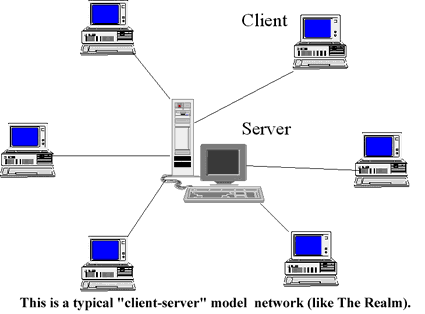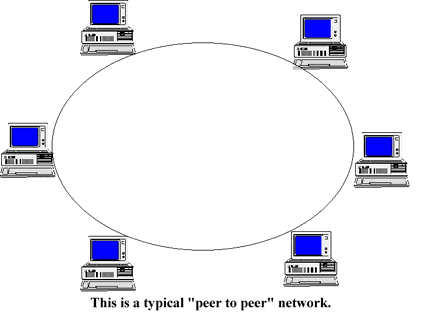 "The Realm" is an advanced MUD (Multi-User Dungeon or Domain) where the users share the same "virtual space" or "virtual reality" in real time.
"The Realm" is an advanced MUD (Multi-User Dungeon or Domain) where the users share the same "virtual space" or "virtual reality" in real time.
These have been around for a fair while, the earliest ones being text based with all the users logging into a central "server" computer at terminals (or later PC's using "terminal emulation" software). This meant that all the commands and processes were run on the central computer, receiving only keystrokes from the "dumb terminals" and sending back responses to their screens.
Besides being all here was in the early days, the major benefit of this was that it was highly secure. All information storage of players' position and stats were kept on the central computer and the processing also happened in the central computer where the security could be monitored. The downside was that with more and more players, and the more complex the games became, the more processes were needed to be handled by the computer per second and more information it had to pipe in and out from it.
 What appeared to be an answer to this was an approach to MUDs which came from another direction ... the ability of stand-alone games to communicate with each other.
What appeared to be an answer to this was an approach to MUDs which came from another direction ... the ability of stand-alone games to communicate with each other.
Of course stand alone games have been around since before Leisuresuit Larry first wandered into a sleazy bar, and have evolved more and more spectacularly as the power of PCs have multiplied. So now we have the likes of Quake, Descent, Command and Conquer etc being played over the Internet. In this scenario there is no central "server" computer doing all the processing and sending information out to "client" terminals, here we have an open number of smaller computers, all running parallel versions of the game in a way known as "peer to peer" (equal to equal). Services such as Kalii (link) act as meeting points for people wanting to play games like this and automate what would otherwise be a complicated configuration process.
The benefit of peer to peer games is that they can look much more spectacular than the likes of The Realm because all the processing is being done locally. But the major downfall is that it is highly insecure and open to many ways of cheating.
Cheating If the major processing of the game is being done in the local computer, then the user's details (health, gold, level etc) will at some point be held in the PC's memory (ram). Smart "hacker" programmers (for lack of a better term) can, and do, write simple little applications that can overright this memory space to instantly give full health, gold, armour, etc or put players in God mode. (Click HERE to find a cheat program that gives full gold for AA. Sorry Janus, but they are out there, and this example proves my point.)
This is also the fate which has befallen Diablo.
 Another downfall of realtime peer to peer games is that the person with the most "lag" or slowest Internet connection is at a major disadvantage. If two players enter combat and one "times out" from lag, the other wins the battle and the points by default.... So in these games, the winner is not the person who plays best, but the one most who most successfully packet bombs, "Nukes", or otherwise disrupts the other person's internet connection. A major international Internet magazine recently published, unwisely, a precise description how to do this. Scary.
Another downfall of realtime peer to peer games is that the person with the most "lag" or slowest Internet connection is at a major disadvantage. If two players enter combat and one "times out" from lag, the other wins the battle and the points by default.... So in these games, the winner is not the person who plays best, but the one most who most successfully packet bombs, "Nukes", or otherwise disrupts the other person's internet connection. A major international Internet magazine recently published, unwisely, a precise description how to do this. Scary.
So where is The Realm in all this? Fortunately, our Realm sticks most closely to the Server/Client model, but cleverly uses client software and local resources (sound files and background images etc) to make it look much better than Zork I.
Basically, all the important stuff, like the amount of gold you have, your experience points, level etc are all computed and stored on the game server at Exodus. And as far as game play is concerned, your PC is a dumb terminal.
Let's say your "toon" is standing in a screen waiting for a KK to appear and I wander by... The server will send your PC a stream of information saying (and this is an approximation) that someone called Andos with height "F1", complextion "27", hair "0E", clothes "F9,23,58,8A,etc...." has walked to co-ordinate X,Y of your screen. And your local software will convert that into my stunnly handsome visage swaggering before you. *grinz*. If you click on me and select "look at", the server will draw out of its databases the details that are shown in that screen.
If I am silly enough to have PVP on and you jump me, an extremely complex arrangements of comparisons of our respective strengths take place on the game server and our battle happens there. Not on your PC or mine. The battle is fought on the main server.
How does this affect me?
Well, in two major ways.
1. If you want to play The Realm by yourself without other user interaction and without bothering to connecting to the Internet, you can't. The software on your PC and your CD is NOT the game... what is on your PC is an absolutely superbly crafted terminal emulation software package. The game is solely on the server. You HAVE TO connect to the server to play and therefore, your playing is governed by the availability and performance of the server and your Internet connection. You play online, or not at all.
2. You don't have to worry about all the security rubbish above. Things like packet bombing, nuking, smurfing, cracks etc. The very server/client architecture which has been designed and protected from the beginning (with wonderful foresight) has meant that hacking the game is (touch wood) close to impossible, and if achieved, easily detectable. OK, there have been level bugs and so forth in the past, (and let's not discuss the "W" word right here!), but within the Realm community these things are looked out for and controlled to the best ability and diligence of the team and the players. It is by no means a lost cause as is the case with other online games.

